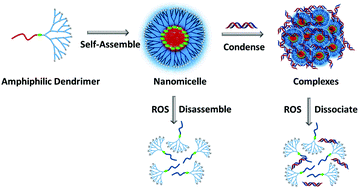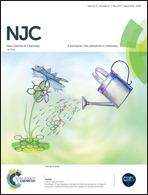Low generation PAMAM-based nanomicelles as ROS-responsive gene vectors with enhanced transfection efficacy and reduced cytotoxicity in vitro†
Abstract
Poly(amidoamine)s (PAMAMs) of high-generations (G > 5) exhibit high efficacy in gene transfection, but their high cost and severe cytotoxicity limit their use in biomedicine. In contrast, PAMAMs of low-generations (G < 3) are less toxic and easy to synthesize, but exhibit low transfection efficacy. In this report, we design a novel amphiphilic dendrimer by conjugating reactive oxygen species (ROS)-responsive poly(propylenesulfide) (PPS) to a low generation PAMAM dendrimer (G = 2, Mw = 3500 Da) via disulfide bonds. This amphiphilic conjugate can self-assemble into stable nanomicelles. The results show that the obtained nanomicelles have a high zeta potential, which can condense DNA tightly. Moreover, the DNA/nanomicelle polyplexes can be fully dissociated by intracellular ROS and easily release the entrapped DNA. As gene vectors, the nanomicelles exhibited high transfection efficacy and fairly low cytotoxicity in vitro.



 Please wait while we load your content...
Please wait while we load your content...